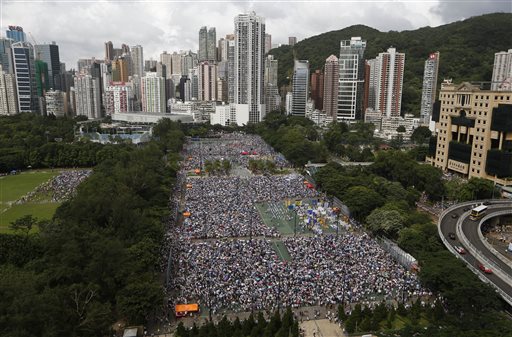On Tuesday, July 1, the 17th anniversary of the handover of Hong Kong to the sovereignty of the People’s Republic of China, some 500,000 residents of what since 1997 is the Hong Kong Special Administrative Region (SAR) marched through the city’s downtown Wanchai and Central districts to demonstrate for genuine democracy.
It was by far the largest such march since 2003, when Hong Kongers turned out in similar numbers to protest the imminent enactment of restrictive internal security legislation threatening free speech and the free press guaranteed in the SAR’s Basic Law enshrining the “One Country, Two Systems” principles.
Much as in 2003, what prompted the massive popular turnout of well over 10% of Hong Kong’s potential electorate, was Beijing’s high-handedness, the clearly perceived threat to basic freedoms and the impartial enforcement of the rule of law, and now central government back-tracking on the promise of free and fair elections by universal suffrage of the city’s chief executive.
The quick background is this: In 2007, in line with provisions in the Basic Law, the Beijing National People’s Congress (NPC) agreed that election of the Hong Kong chief executive by universal suffrage would be implemented by 2017. Since 2013, consultations on the specific mode of election including different possible nomination systems (decision on who can run) have been held in Hong Kong and between Hong Kong and Beijing. As it emerged that Beijing resolutely opposes an open nomination system and favors appointing a small nominating committee selected by the currently ruling pro-Beijing parties strong and growing opposition to such a rigged process sprang up and culminated in a mock referendum organized by the so-called “Occupy Central with Love and Peace” group, in which nearly 800,000 Hong Kongers participated and “voted” by a margin of over 88% for a nominating and suffrage system that meets accepted international standards.
The perfectly innocuous process produced unbridled ire and backlash from Beijing. The State Council (the PRC central government) produced and on June 10 published a lengthy White Paper, titled “The Practise of the ‘One Country, Two Systems’ Policy in the Hong Kong Special Administrative Region,” which notably in section V (“Fully and Accurately Understanding and Implementing the Policy of ‘One Country, Two Systems'”) heaps scorn on the “many wrong views that are currently rife in Hong Kong” and demands, in particular, that “the Hong Kong people who govern Hong Kong should above all be patriotic.” “Patriotic”, of course, is thinly-disguised code for supportive of Beijing — as though demanding fair and free elections not predetermined in their outcome by a rigged nomination system were somehow un-patriotic.
The headline of Hong Kong’s largest English-language newspaper this morning reads: Beijing is unmoved by massive rally turnout; subhead: As fallout from protest spreads, advisers [to the Beijing government] warn of social and financial crisis if conflict over the city’s pro-democracy movement escalates.
So, there you have it: Calls for fair and free elections and the impartial rule of law are deemed by Beijing to cause social and financial crisis. It is, naturally, precisely that attitude, an attitude that threatens to restrict the guaranteed freedoms of Hong Kong, that could cause instability and turmoil.
To be fair, since the 1997 return of Hong Kong to Chinese sovereignty, the worst fears of many on Hong Kong’s future have not materialized. But the future will be different if Beijing now nervously begins to assert its authority in more high-handed manner. It would be a serious Beijing policy mistake and one that not only Hong Kongers need to rally against.

COMMENTS
Please let us know if you're having issues with commenting.